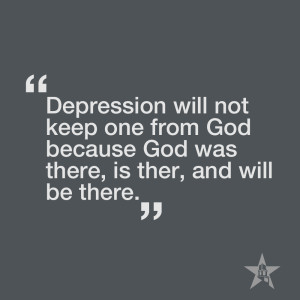One of my favorite Christian bloggers is beginning a review series on Tim LaHaye’s (author of the Left Behind series) book How to Win Over Depression, a self-help manual popular in conservative evangelical circles.
LaHaye’s work is a reflection of common misconceptions that Christians often hold about people with depression. With chapter titles such as “Self-Pity and Depression,” followed by “How to Overcome Self Pity” and even “Depression and the Occult”, LaHaye promotes the idea that depression stems from an individual’s character flaws. In the introduction he even states: he is “certain that most depression (is) caused primarily by sin, a faulty thinking pattern, or some failure on the part of the individual to claim the promises of God.”
 This lie cannot be tolerated any longer.
This lie cannot be tolerated any longer.
Depression is not brought on by a character flaw, failing to love Jesus enough, or not having memorized enough Bible “promises”.
Rather, depression is one of those awful things that happens for reasons we cannot always explain. Depression is like a tornado, and just as a tornado may destroy a homeless shelter yet leave a crack house standing, sometimes good, loving, kind people, including Christians, are chemically imbalanced or experiencing major life difficulties. The jerks who deserve to be depressed are probably out skipping in a sunny field somewhere.
Even Christians who understand this may still cling to another destructive idea: that depression is a hindrance to faith. For a Christian to be useful to the Kingdom, depression must be “dealt with” ASAP.
Yet when I read the Scriptures what I am presented with is quite different. Instead I see Job and Naomi, two people who suffered tremendously yet found the love of God in the midst of long term despair.
In two sudden series of tragedies, Job lost his family, his wealth, and his physical and emotional health. He went from being a respectable man to being a horribly disfigured nobody. His friends who sought to care for Job found him on the ground, self-harming with a sharp piece of pottery. (Job 2:8)
Contrary to what many would assume of a depressed person, Job the wallowing, depressed cutter came face to face with God. He asked Yahweh deep questions and received profound answers in return. While many flip to the end and think that Job’s redemption came when his heirs, belongings, and health were restored, the actual redemption Job experienced happened in his hold-nothing-back dialogue with God. This communion with God occurred when Job was in the depths, screaming to the heavens “Why?” and cutting his arms.
Anyone who feels like a spiritual failure because of stumbling into self-harm should read the story of Job and take heart.
 Then there is Naomi, who suffered through famine, the death of her husband and sons, poverty, and the infertility of her daughters in law. Upon her return to Bethlehem, Naomi declared that Yahweh had turned his back on her and that she was bitter as hell for it.
Then there is Naomi, who suffered through famine, the death of her husband and sons, poverty, and the infertility of her daughters in law. Upon her return to Bethlehem, Naomi declared that Yahweh had turned his back on her and that she was bitter as hell for it.
Praise God that Naomi had a friend (Ruth) who resolved never to leave her, who sacrificed her future for her well being. Notice that Ruth did not exhort Naomi to claim the promises of God or pray to be delivered from self-pity.
As Christians we believe that in Christ’s life, death, and resurrection, there is no part of the human experience that Jesus has not been through and overcome. I am not claiming that Jesus experienced depression, though it is certainly possible. In the Passion narrative, Jesus cried out to God, “My God, my God, why have you forsaken me?” (Mark 15:34)
At this moment, God knew how it was to feel abandoned by God.
If God has felt the full weight of hopelessness and abandonment, then to say that depression is a hindrance to God is just wrong. Depression will not keep one from God because God was there, is there, and will be there.
Therefore, I encourage all of those at Houghton who suffer from bouts of depression to take shelter in the empathy and compassion of God.
I ask all those at Houghton who know someone with depression to be a witness to that love and compassion in word and deed.
